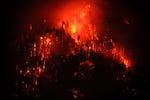When wildfires are burning around the state, it’s hard for the Oregon Department of Forestry to focus on anything else.
During a recent meeting of the Oregon Board of Forestry, state forester Peter Daugherty repeatedly explained how the agency has had to put a lot of routine forest management work — including fire prevention — on hold this summer.
"Pretty much all my time over the past month has been focused on the fire season," Daugherty said.

The Eagle Creek Fire burns Monday, Sept. 4, 2017, as it makes its way through the Columbia River Gorge.
Ian McCluskey / OPB
It's not a new problem for the Department of Forestry. An audit by the Oregon Secretary of State's Office last year concluded that the agency is "fighting more severe fires with about the same number of employees it had nearly 20 years ago." Auditors said that's left the agency's employees over-worked and over-stressed.
It's a problem not likely to change anytime soon.
The number of acres burned by wildfires in the Northwest could quadruple by the end of this century, according to the latest national climate assessment.
Sen. Michael Dembrow, D-Portland, said the fires are a call to action.
“Climate change is here. It's real. We need to work to alleviate it,” he said.
Dembrow is one of several lawmakers pushing a bill that would put a cap on carbon emissions and charge companies that exceed the limit. Although the idea has been floated in Salem for years, Dembrow said proceeds from it could be used for forest thinning programs to reduce the likelihood of catastrophic burns.
“Yes, our forests can be a way of capturing our carbon, but they can also be dangerous sources of carbon if fire gets out of control," he said.
GOP lawmakers in Salem have long balked at putting a hard limit on greenhouse gas emissions. And they don’t like the idea of linking carbon caps to the issue of wildfires.
Related: Conservation Groups Raise Gorge Salvage Logging Concerns
Republicans blame stricter laws, as well as lawsuits from environmental groups, for limiting the amount of logging in Northwest forests. They say more logging would reduce the available fuels, and therefore lead to fewer and less catastrophic fires.
Several GOP lawmakers who represent districts especially hard hit by wildfires are demanding that the Legislature hold hearings on forest management.
In a letter to Dembrow, who chairs the Oregon Senate's Committee on Environment and Natural Resources, Grants Pass Republican Sen. Herman Baertschiger wrote he wants "real solutions that will systemically address wildland fires, now and in the future, to reverse the course of abjectly failed policies that promoted a lack of management and planning for prevention of such catastrophes."
Dembrow said his committee will get a brief update on the fire season during a meeting later this month, but will take a deeper dive on the issue in November.
Some Democrats are also calling for increased attention on wildfire issues.
Sen. Betsy Johnson, D-Scappoose, said she’s in the early stages of forming a so-called “Wildfire Caucus” for lawmakers who want to make sure the issue stays in the spotlight at the state Capitol.
Of course, there’s a lot of forest management policy that’s largely outside the reach of state government. That’s because vast areas of Oregon woodlands are owned by the federal government.
Related: Eagle Creek Fire Brings Together Local, State, Federal Leaders
Democratic Gov. Kate Brown said federal agencies like the U.S. Forest Service and the Bureau of Land Management have not given forest lands the attention they need. She said both the state and federal government should devote more money to forest thinning projects that could reduce the spread of wildfires.
"We need to move from a defensive posture to a proactive one," she said. "If they had the resources at the federal level to do the prevention and treatment, we would not be in this downward spiral.”
As for Daugherty, the state forester, he doesn’t want to say whether he thinks more intense wildfire seasons are here to stay. But he does think the state may need to adjust its strategies.
"I think we do need to step back after this fire season and make an examination of current policy," Daugherty said.
But with fires still raging around the state, that conversation could still be months away from getting started.